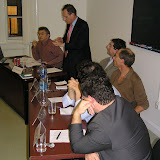POLITICAL ECONOMY RESEARCH GROUP organized a round table discussion on:
THE CURRENT FINANCIAL CRISIS: CAUSES, CONSEQUENCES AND LESSONS FOR THEORY AND POLICY
Pictures and complete audio recording (also for download as mp3), and full written summary, from the event available bellow .
Event took place on Tuesday, November 4th at 5.30 p.m. at Central European University Budapest, Nador ut. 9 (MB 201)
Discussion was chaired by Julius Horvath (IRES/ECON), with following participants: Laszlo Csaba (IRES), Bob Hancke (POLSCI/IRES and LSE), Don Kalb (SOC.AN), Ugo Pagano (ECON), Gyorgy Szapary (ECON)
Audio Recordings provided by Gergo Medve-Balint:
1. Gyorgy Szapary Download mp3
2. Bob Hancke Download mp3
4. Ugo Pagano Download mp3
5. Don Kalb download mp3
6. Laszlo Csaba download mp3 A download mp3 B
Discussion:
Part 1: download mp3
Part 2: download mp3
Part 3: download mp3
Part 4: download mp3
 |
| Financial Crisis Panel - PERG - CEU, 4 November 2008 |
Summary: By Vera Asenova
The Current Financial Crisis: Causes, Consequences and Lessons for Theory and Policy
The good news for academics these days is that in time of financial crisis explanations for what the hell happened, are in high demand. The supply of analysis of the situation is not scarce either. Suddenly, all schools of thought celebrate the ultimate prove of their point, the crisis finally demonstrating empirically what the theory has been developing for so many years. Yet none of them is admitting defeat, and none will really disappear.
In an attempt to generate an inclusive debate across disciplines, theories and viewpoints PERG organized a public round table discussion under the title: The current financial crisis – causes, consequences and lessons for theory and policy. Our guest speakers were CEU faculty members from different departments: Laszlo Csaba (IRES), Bob Hancke (POLSCI/IRES and LSE), Don Kalb (SOC.AN), Ugo Pagano (ECON), Gyorgy Szapary (ECON), the discussion was chaired by Julius Horvath (IRES/ECON).
Prof. Szapary, who is also a vice-governor of the National Bank of Hungary, started with outlining the main reasons for the subprime crisis - excess liquidity, and low interest rates, which were kept for too long of a period in the USA, while inflation was also low; on the housing market the high loan to value ratio generated a big amount of toxic assets in the banking system, which is the second main reason for the crisis. He presented the bubble as a rise of real estate prices much higher than the rise of production costs for homes and the population growth. This bubble soon triggered panic: “social intoxication,” and confidence crisis, with banks having stopped lending to each other. The lack of regulation on investment banks and hedge funds had put them in a position of being “too big to fail”, which was not recognized by the national authorities on time. What followed were bankruptcies unseen before in the USA, UK, and Europe, which called for decisive government action. They had “nothing right on the left and nothing left on the right” to use Szapary’s words. Still, two kinds of policy actions followed – central bank injection of liquidity into the financial system, and government bailouts of banks through recapitalization of banks, purchases of toxic assets and deposit guarantees. 3000 billion USD is the total US government commitment so far. Growing fiscal deficit and government debt, followed by increase of taxes, unemployment, inflation and huge losses of wealth are the main consequences of the crisis. One of the lessons to learn is that measures for international burden sharing are needed in a globalized financial world. The countries with the majority of foreign owned banks face a problem of mother banks terminating lending to their subsidiaries abroad, thus forcing the national central banks to bail them out, or inject liquidity beyond its capacity. At the same time, an obvious conflict of interests arises for the central banks in the countries of the origin of the mother banks, who feel reluctant to export capital to foreign financial systems. Who should be the lender of last resort in a globalized financial system?
Bob Hancke spoke of the political roots of the crisis, which in his view lies in the independence of central banks. Lack of regulation, the political roots of the crisis lie in the decision taken in the nineties to deregulate the financial sector. Central Banks have failed as apolitical regulatory agencies, and many of them have in fact been captured by investment banks – serving their particular interests by keeping the interest rates too low. The rule based monetary policy worked for a short while, but soon governments had to come back into the driving seat, although formerly they were considered incapable. Today’s crisis proves this is not true; governments are the viable alternative to failing markets. What they are doing today is not so different from what they did in the thirties. After ”trying out” communism and fascism as alternatives to laissez-faire, social democracy emerged as an understanding that markets are fundamentally good, but you need to regulate them well. It is the kind of viable system where governments play a large role in the economy through central banks and fiscal policy. Hancke opened the debate on central banks and what they are really for. Currently their mandate is diffuse, focused on price stability without achieving it, while the stability of the financial system is taken out of the mandate. Thus the current crisis has shown that central banks are losing their legitimacy, as well as their independence.
Ugo Pagano’s talk entitled “The End of Anglo-American capitalism?“
Both models of capitalism are susceptible to systemic crisis – the one based on flexible financial and labor markets, and the one based on arms length relations between creditors and debtors. The weakness of the Anglo-American flexibility model have now become very clear, and they come down to diluting of agency relations, and destruction of social capital; lower total monitoring; and arising of new rigidities. This new rigidity plays itself out as an impossibility to renegotiate the debt when the price of the collateral went down – when everybody is a creditor the bargaining and renegotiating of debt becomes very difficult.
Secondly, Pagano also shares the view that bubbles are characteristic of the economy – high expectations drive prices up, this was the case of the internet bubble, oil bubble etc. each bubble has a grain of truth – a reason to believe that prices will go up (internet is a great thing; emerging industries, China and India will increase global oil demand etc.) but this grain of truth gets hugely inflated. The more financial instruments created on the basis of this inflated expectation the bigger the bubble gets.
A third phenomenon is the moral hazard problem – some actors are too big, and too interconnected to fail. The danger would have been less severe if these institutions were never allowed to become so big, or to have kept the financial sector under control.
What will happen now? America and Europe follow two different roads. America is an earlier democracy, which believed that wealth should not be concentrated in the hands of a few big families but dispersed. Still the financial sector performed a hidden redistribution function, and is currently in crisis.
Europe’s trajectory starts with first having the big families ruling through concentration of capital. On the other hand, the power of workers is concentrated in trade unions that react, and trigger change.
England started as a strong families, and strong unions capitalism, and moved to a dispersed ownership American model, and is now in crisis due to its huge financial sector and huge state intervention. But this is not the end of the Anglo-American model of capitalism.
Don Kalb – the VoC [Variety of Capitalism] schools is happy about this crisis as it puts the question of what kind of regulation are we going to have. But we need to discuss societies, because societies drive politics, which drive institutions. One thing we learn from this crisis is that institutions don’t work if they are left alone. Even if you introduce more regulation, you need societies to do politics. To analyze the real social forms beyond the Polanyian and VoC framework. Kalb proposed a society-based explanation of the crisis. The neoliberal policies dominant in the last thirty years had two crucial characteristics, which are deeply contradictory and colliding:
- Increased ‘financialization’ of social life – social relations, markets, states;
- Increased social inequality and polarization.
These coinciding developments can explain why the subprime private sector is the domain of the crisis. Regulatory interventions try to prevent, or react to the problem, but cannot succeed. The neoliberal era is an era not of deregulation but of private regulation of risk; the crisis starts form large private indebtedness in the core, which built up in the nineties, and burst out recently. Income stagnation was combined with injections of cheap liquidity (provided by China, Japan and Germany) prevented the contradiction from colliding. Growing private indebtedness, declining prices and inflexible relations have been the causes of the crisis. The possibilities of reversing this adverse combination of social polarization and ‘financialization’ of society lies in the future political decisions taken in the USA. Hopefully Obama, who gets elected today, will listen better than his predecessors.
Laszlo Csaba “The Hungarian reaction. A reaction to what?” Csaba focused on the situation in Hungary which is not facing a deep capitalist crisis like the USA but a panic on the financial market. Due to the underdevelopment of its financial system, Hungary can never commit the mistakes of the USA – the benefits of backwardness. Before discussing the Hungarian government reaction, one needs first to define a reaction what is being sought. Unlike the great depression 1929-35 an overall contraction of GDP in the American economy is not present om the real economy which is not in recession yet. Situations of panic are typical of the financial market. This market has been the source of immense wealth creation – the system which is unregulated, unjust etc. has contributed to eighty percent of the wealth in the last hundred years.
The name of the game is psychology, and the main issue here is the trust. In Hungary the government has very low credibility both because of its members, and because of its economic policy. People do not care about the government because it is politically compromised, and also because it keeps making welfare promises it does not deliver. Low level of credibility is an especially big problem in times of crisis.
Now the reaction of the government was not to listen to the warnings. The national bank, research institutions, and other organizations have been warning the government that tax and spending policy does not work in a small open economy, which has high degree of vulnerability. In this case sustaining a national currency is a luxury and it also enhances the vulnerability of the economy. Joining the currency union as soon as possible should be a priority also of the government, as well as of the median voter. When the crisis hit, the government did not believe it, and kept saying that this was an American problem, which does not affect Hungary. In addition to the liquidity crisis, there was a recent attack on the Hungarian Forint, which lead to almost 20% devaluation of the exchange rate, and from this moment the panic spread. The forecasts was a slum of - 1.5%. An emergency plan was provided by an IMF standby loan of 25 billion dollars together with the European Union, and the World Bank. The attack has now been partially reversed, and the stock exchange is recovering.
Csaba was skeptical regarding the benefits of crisis often discussed by economists – the idea that hard times provide a window of opportunity to sell the wonderful ideas of the economic science to politicians, and bring reform. The primacy of politics will close the window of opportunity and instead of long term economic growth, short term measures, and muddling through will take place for as long as possible.
What followed was an exciting discussion, which can be found on our blog. A commitment to organize another discussion on the topic later, and a few rounds of drinks at a nearby bar.





No comments:
Post a Comment